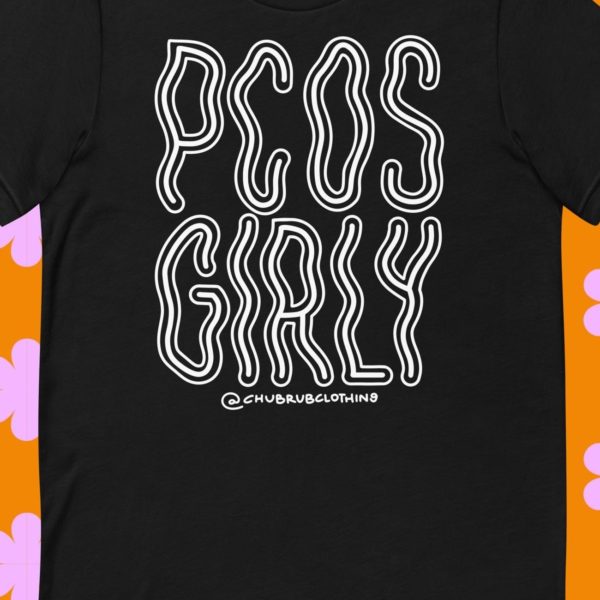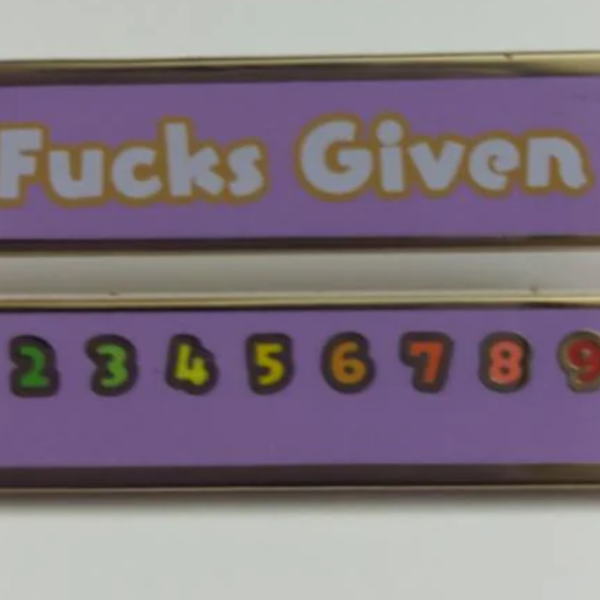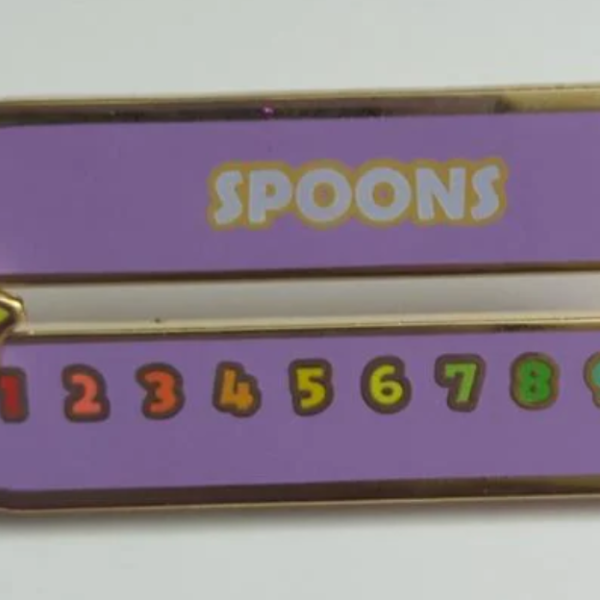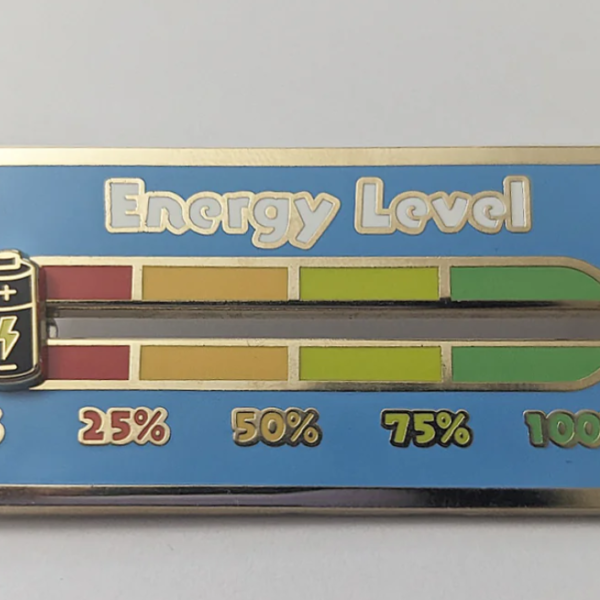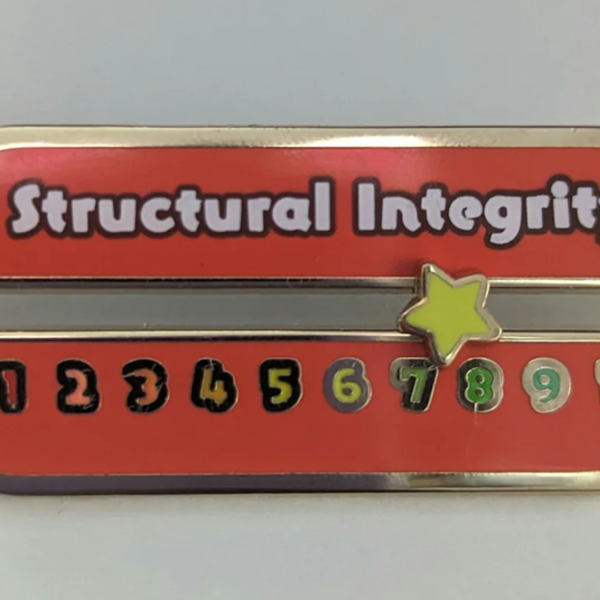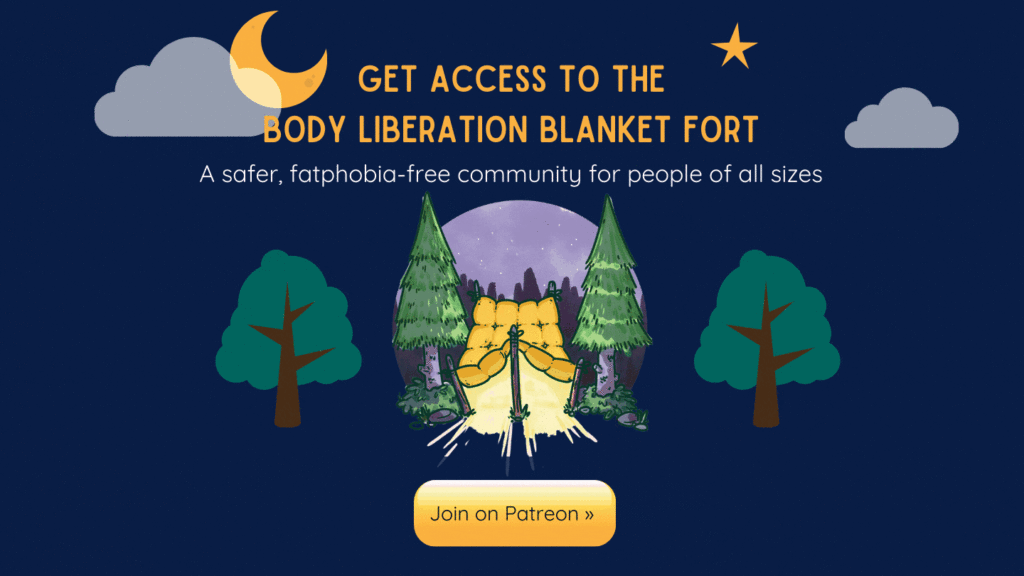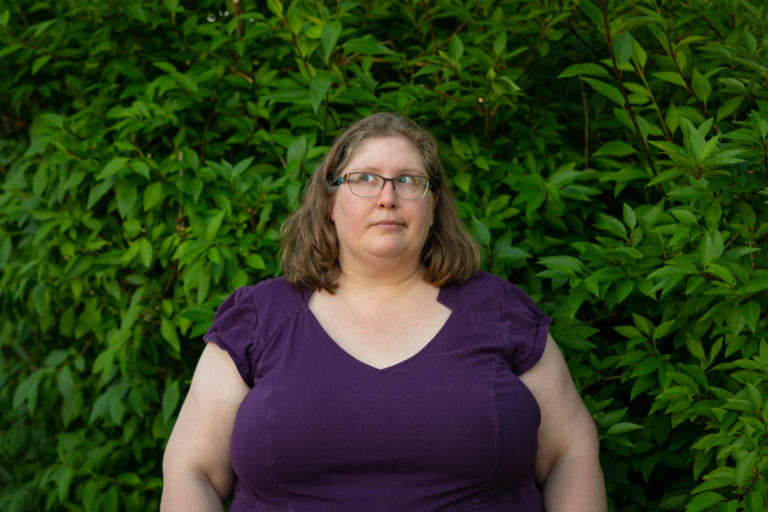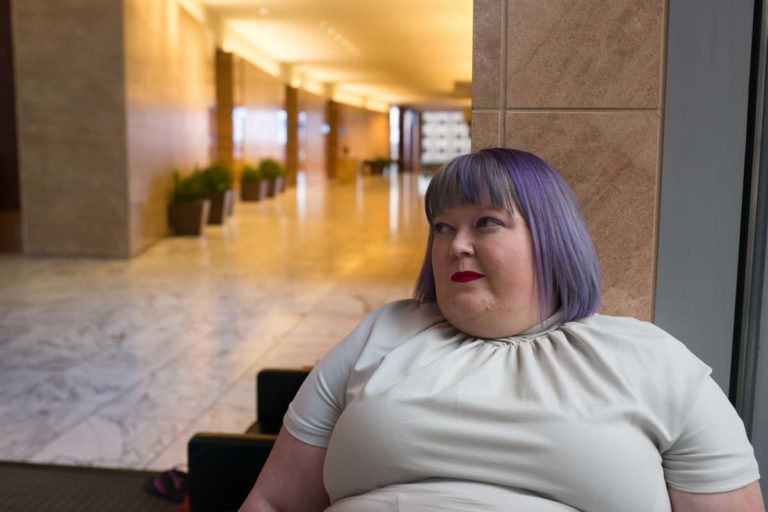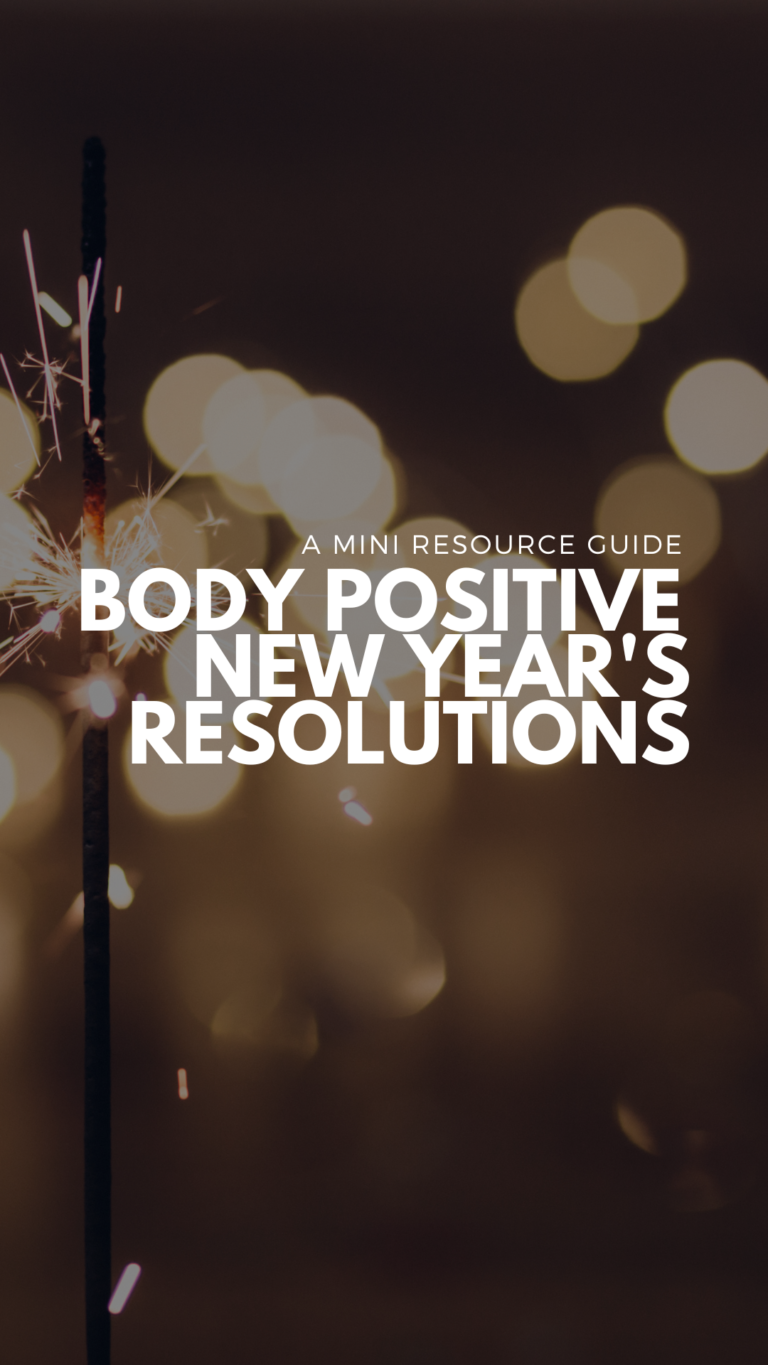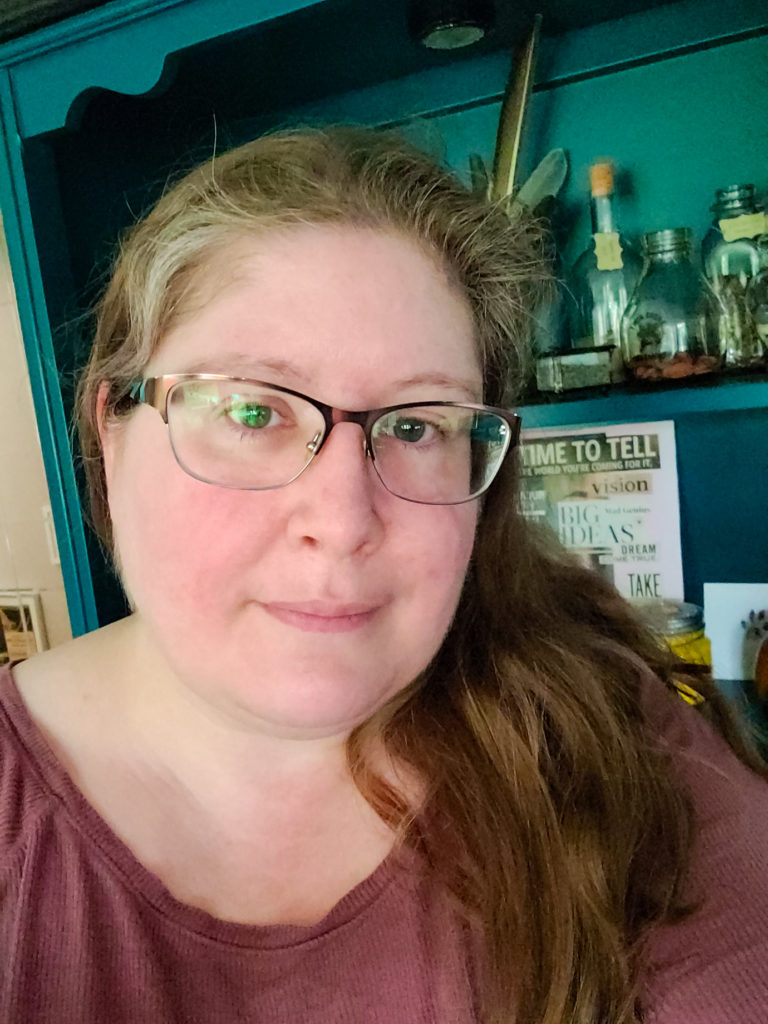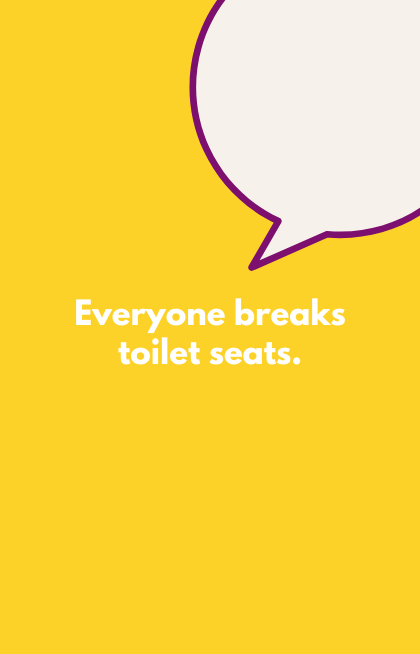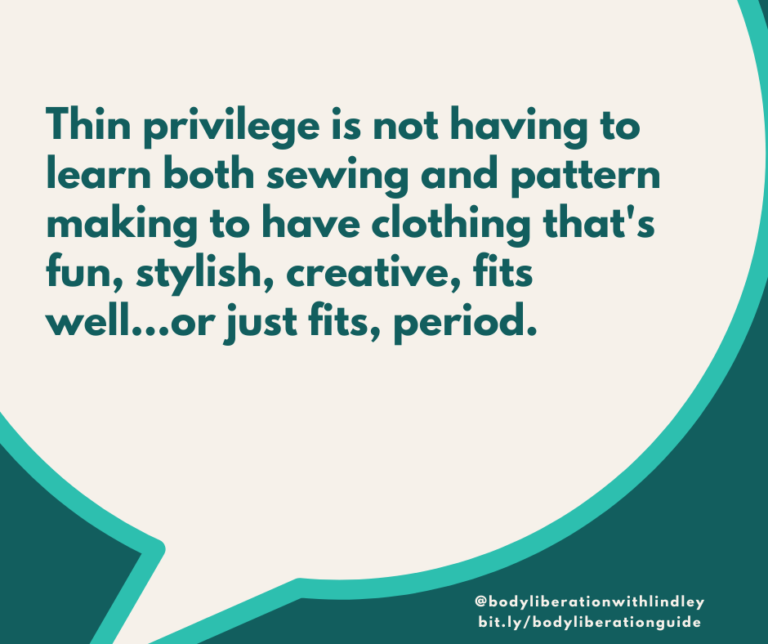LISTEN: Lindley on It’s Okay to Feel (with transcript)
Image description: Lindley, a fat white woman, stands in a pink and blue plaid shirt in front of a wall covered in yellow and brown vines. Her photo is surrounded by a light blue border with text on top that reads, NAMI Orange County presents…It’s Okay to Feel with Jenipher and Non. The podcast title is Our Beautiful Bodies with Lindley Ashline.
This is the first podcast where I’ve ever needed to stop and ask, “Can I say this on the air?” Nōn Wels, Jenipher Lyn and I talk about body image advice for the Tiktok generation, porn and Photoshop, health at EVERY size and more for NAMI Orange County. The National Alliance on Mental Illness (NAMI) conducts free educational programs, meetings and support groups that address every aspect of mental health. Listen and read below!
Transcript
Jenipher: Hello! Welcome to It’s Okay to Feel with Jenipher and Nōn, a NAMI OC podcast where we explore mental health topics to help you feel your feelings and feel a little less alone. We’re so happy you’re here. Now, on to the show.
Nōn: Welcome to It’s Okay to Feel, a NAMI OC podcast. My name is Nōn Wels. I am one of two co-hosts in this show. My other co-host is a friend of mine. She is freckly. She is based in Florida. She’s bright and bubbly… and I adore her. Her name is Jenipher Lyn. Hello, Jenipher.
Jenipher: Hi…
Nōn: And suddenly, Jenipher is turned into Eeyore.
Jenipher: A mixture of Eeyore and Sadness from—
Nōn: Inside Out?
Jenipher: Yes. Thank you. My brain is—
Nōn: I love that movie, Inside Out. It’s so good. I even wrote a piece on my blog when that movie came out because I was touched by it.
Jenipher: I am so grateful a movie like that even existed. Can you imagine, it took this long. And I think it’s the only one that exists still.
Nōn: Right! I want to change that.
Jenipher: We’re writing a movie tomorrow. Let’s write a movie.
New at Body Liberation Stock
Nōn: Yes, exactly.
Jenipher: Amy Poehler, you will be in it.
Nōn: There you go. I love Amy Poehler.
So today, we’re talking about thin privilege. We’re talking about body image. We’re talking about body positivity… all of these very important items. We interviewed Lindley Ashline today.
Jenipher: It’s so good.
Nōn: It’s great. She’s amazing. She has just so much knowledge and she does wonderful work. Her business is called Body Liberation Photography. It’s wonderful. And you’re going to love, love, love the conversation.
But before we get to that, we’re just going to talk about body image and how it relates to us and what we feel about it.
Jenipher: Tell me about your body, Nōn.
Nōn: Okay… well, I’ve got two arms, I’ve got two legs.
Jenipher: Oh, no. The detective is back.
Nōn: See? Let’s see. Yes, body image. It’s weird. Bodies are wonderful and beautiful and unique. And that’s definitely a thing we want to continue to reiterate on this episode, is that all bodies are different, and all bodies are beautiful.
When it comes to body image and body positivity as it pertains to me, specifically, I identify as a man. I also have thin privilege. I’m in a normal body. I’m also able-bodied. And so, there’s definitely some weight there that—I mean, philosophical and emotional weight, I mean—that I have to contend with. And it’s important to think about.
I’m also someone who’s had an eating disorder in the past. And we’re going to talk about that at a later episode, eating disorders specifically.
But I guess I feel frustrated and sad that things exist in the world that tell us that we need to be a certain way and have a certain shape, this shape is good and this shape is bad… it just makes me sad.
Jenipher: Yes, a lot of the things she talked about, because I am a small, human being—and by small, I mean, kid-sized human being.
Nōn: She fits in a purse.
Jenipher: I fit in a dog purse, everybody. No. But I wear the kid sizes in stores generally. But what she talked about, really, it made me sad. It made me sad for multiple reasons.
It made me sad because I never even thought about some of the things she discussed like fitting in a chair at a doctor’s office. That never occurred to me. Then it made me feel guilty because why haven’t I thought about these things?
And guilt is my auto mode, generally, for many things, including my body.
Nōn: Jenipher Lyn, powered by guilt.
Jenipher: Powered by guilt and unworthiness.
Nōn: No, I get it! I feel the same. And it’s another reminder that intersectionality is important. We all have a spectrum of gender identity, body, mental health, racial background, and all of it. All of it is important to be a part of who we are and make up who we are. And when we’re addressing topics like this, it’s important to think about it because it helps with empathy. It helps with learning and finding different perspectives from each other. And that’s an important part of healing and connecting with one another.
When I think about the messages that people see and hear and feel online, everywhere, I think you mentioned it recently, Jenipher, just the onslaught of shininess that is Instagram. Especially in the wellness industry, there’s just thin, white people everywhere. And it’s important not to disparage people for being what they are, but it’s a symptom of a society that is based in thin, white, blue-haired—blue-haired?
Jenipher: Blue-haired.
Nōn: Blue-haired, tattooed, no I was just kidding—blue eyes and blonde. That stems from racism and where our country started. And that has been the ideal. And we need to fight against that. We need to challenge that.
How do we challenge that? What are some ways that we can fight against that onslaught of, “You need to look a certain way, be a certain way. Your body needs to be this thing.”
Jenipher: I think we can cry in the corner.
Nōn: Sure, that’s a method.
Jenipher: Yes. That might be the best. No. You don’t want to cry in the corner. I think it’s important. And I definitely need to take more action doing this where—
Well, first off, if there is anyone who makes you feel inferior, whether it’s based on any particular reason, unfollow anybody. I follow people because I have a lot of insecurity, which maybe that’s not the healthiest way of unfollowing, but if people aren’t—well, let’s move on to the next thing.
Try and be more—I said this so much more eloquently, like the last time we were recording this the first time. But it’s important, especially right now, with so many unjust things coming—I don’t want to say “coming to light.” I feel like I’m learning so much. There’s so much I need to learn about. That means I have to follow different people, people like Lindley, who could teach me—not teach me, I hate that word too.
I am not saying this well. Nōn?
Nōn: No, let me try to extrapolate what you’re saying because—
Jenipher: I could use a big word.
Nōn: Extrapolate. No, I think what you’re saying is important. And what I hear you saying is that a piece of body image and trying to relate and have empathy for people maybe in larger bodies that are dealing with struggles and obstacles that are just set up for our society that I am not experiencing, that you’re not experiencing, Jenipher, perhaps, it’s important to surround yourself with people who are going to allow you to see things from a different perspective. That is empathy.
That is the practice and effort of empathy. It takes work. And that is an important general rule for mental health, to think about and to allow ourselves moments of discomfort, because in that discomfort, there is clarity, there is learning, there is seeing things from a different perspective. There are all of these things. And the same is true of body image.
One of the things you said when we talked about it a little bit in our chat with Lindley is curate your Instagram feed. Unfollow people who make you feel less than. The reality is your body is beautiful. There are different shapes, and there is no bad or good. As much as capitalism wants to say that there is only one way to look and it’s good, and that’s what makes you money, and whatever… no! It’s our job to fight against that.
Jenipher: Agreed! The wellness part of society, it’s now like a buzzy word. And she does mention, I think it’s a $78-billion industry or something.
I did mention earlier to you, but I was scrolling through Instagram, and a shiny person came on the screen, and I was very drawn to this girl because she has shiny, straight—which I do not have straight hair. That’s what you’re supposed to have in society, like beautiful, silky, straight hair… beautiful blue eyes.
And what struck me is that she did write a very sincere post about self-care and why she needed to recharge herself because of x, y, z, or whatever.
But then at the end, it was an ad for all these make-up brands. And not discredit her need for self-care or how shiny and blonde her hair is, but that alone made me so upset because I’m just like, “Well now, it’s consumerism mixed with self-care.”
I did scroll through the comments. And the comments, they were healthy comments. So at least there’s that. Maybe no one else noticed it’s an ad. It just made me sad.
Nōn: Yeah… and I think in a later episode, we’re going to get into more of the influence or culture and stuff like that.
New in the Body Love Shop
Jenipher: We have a great guest for that too. I’m so excited.
Nōn: Yes, and there’s a lot of unhealthiness in that, and buying into capitalism, and buying into these thin ideals around body image and stuff. So look out for that.
I guess I just want to say me, as someone who is in a thin body, who is in an able body, who is in a white, male body, it’s my job—and this is my own, personal work that I’m just talking about here. But it’s my job to allow that to be fodder for information when I apply empathy, and when I think about these things because in doing so allows me to remember that I do have privilege. I do have men’s privileges.
That doesn’t make anything bad or it doesn’t take away from the fact that, yes, things haven’t always been easy. Two truths can exist at once. That’s an important lesson. But when it comes to body image and stuff, it just allows me a broader, more empathetic, caring, curious lens. I think that’s important for all of us when it comes to these topics.
Jenipher: Plus, I think we’re brainwashed as a society. And it’s good to educate ourselves, especially on things that we don’t know that much about. And I feel like—well no, I shouldn’t even say that. But I just feel like it’s very good.
There are so many ways we could educate ourselves right now, especially in empathy and understanding other people—size, color, gender, anything at all. And there are ways to do it. There are incredible people like Lindley who are very openly, even though she’s being trolled and attacked sometimes just based on what she looks like, or who she is, or who she’s talking about, there are people who are helping us understand, helping us learn to love other people or ourselves and/or ourselves more.
Nōn: Yes, absolutely. It’s our job to burn down the structures of oppression. That’s really what it’s about. It’s all of our jobs.
Well, let’s get into the interview with Lindley. It’s an amazing interview. Listeners, we think you’re going to love it. We know we
loved it. So I just wanted to say that I am a silly boy, not a therapist, and It’s Okay to Feel is for information, educational, and/or entertainment purposes only. It is not a substitute for medical or psychiatric advice, diagnosis or treatment. Again, we’re not therapists. There are some amazing resources and a warm line on the NAMIOC.org website you can check out.
We are also funded. We have a funding statement, we should say. I want Jenipher to say this because it’s her favorite. She loves saying this.
Jenipher: I really thought you were going to say it today.
Nōn: I know, sorry. I did sound like I was going to.
Jenipher: It’s Okay to Feel is sponsored by the Orange County Health Care Agency, OCHCA, Behavioral Health Services, Coronavirus Aid Relief and Economic Security Cares Act.
Basically, that just means, all these people support our mission, support chatting about mental wellness more, and we are grateful to be a part of it.
Nōn: So grateful! This short run, limited run podcast series, this project, is very near and dear to our hearts. And we’re so thankful to be a part of it.
Jenipher, where can the listeners connect with you, specifically?
Jenipher: They can find me on my website is JenipherLyn, or on Instagram, same thing, JenipherLyn. I’m trying to resurrect my podcast Instagram. It’s @rainydaydiariespod. It is on hiatus but there are 51 wondrous episodes about uplifting and some hard topics. How about you?
Nōn: My podcast is called You, Me, Empathy. You can find it and listen to it everywhere. I release a new episode every Monday. It’s a deep dive conversation, long form. And there are, I don’t know, 150 episodes or so at this point.
Jenipher: Oh, sure. Beat me.
Nōn: Yes, I’m winning.
Jenipher: You are winning.
Nōn: I’m—
Jenipher: I’m on a hiatus.
Nōn: Just kidding.
Jenipher: We’re on a break.
Nōn: There’s no competition. And my little, small, special passion project—
Jenipher: Small for now.
Nōn: Thank you. Thank you… theFeely Human Collective. You can learn more about that at FeelyHuman.co. And I’m on Instagram, @FeelyHuman and @YouMeEmpathy.
Thank you, listeners, for listening. And I hope you enjoy our conversation with Lindley Ashline on body image, body positivity, thin privilege, et cetera. It’s wonderful.
And hey, remember that your feelings are valid. Your feelings are guide posts on your journey. And it’s always okay to feel.
Nōn: Welcome to It’s Okay to Feel. It’s a podcast by NAMI OC and me, Nōn Wels, and my co-host, Jenipher Lyn. Hello, Jenipher.
Jenipher: Hello. That’s me.
Nōn: Hey! Today on the show, we are chatting with someone I met about a year ago at Camp Heal, someone I admire, someone who is doing wonderful work in the world. Her name is Lindley Ashline. Hello, Lindley.
Lindley Ashline: Hello.
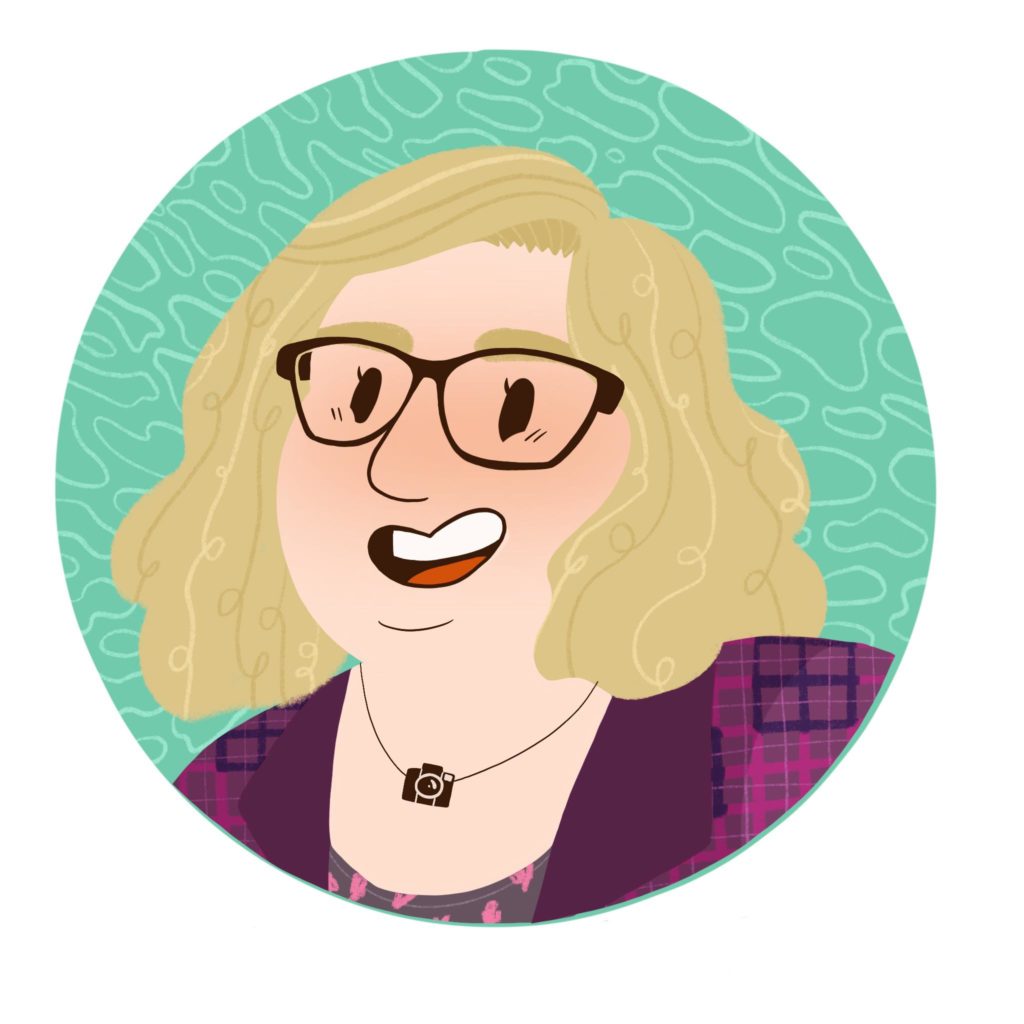
Every Monday, I send out my Body Liberation Guide, a thoughtful email jam-packed with resources on body liberation, weight stigma, body image and more. And it’s free. Let’s change the world together. Subscribe »
Nōn: How are you?
Lindley Ashline: I’m good.
Nōn: Good to hear. We’re so happy to have you here. We’re so happy to hear more about the work you’re doing in the world. Before we get to that though, let’s allow the listeners to learn a little bit about yourself. Can you introduce yourself and tell the listeners a little bit about what you do?
Lindley Ashline: Yes, so I’m Lindley Ashline, and I’m a body positive and fat positive photographer. We’ll talk a little bit about what that means later in the show. But I’m also an author and activist.
I live outside Seattle, Washington, with my husband and my feline overlord who—you can’t see this because you’re only getting audio, but she is sleeping adorably right behind me. So just imagine an adorable cat in the background of this show, the whole episode, and you’ll have it about right.
Nōn: It feels like feline overlord is a bit of a redundancy.
Lindley Ashline: That’s true…
Nōn: Just call them cats or felines. The overlord is implied.
Well, we’re so happy to have you here. Body positivity, health at every size, thin privilege… these are essential topics when it comes to mental health, and especially for our audiences a bit younger than we are. I know certainly there is so much weird societal pressure and just very vile and unhealthy perspectives on our bodies that exist in the world.
I want to get into this topic by talking about body shame, and where that comes from. And maybe, Lindley, talk a little bit about your experience with body shame.
Lindley Ashline: Yes, so my personal experience is actually a little unusual as far as our—in the U.S., in the last half century—I’m 40 years old. And my story is a little bit unusual, different from most of the people that I know, as far as my relationship with my body because I grew up without a TV. We had a TV in our house. Functionally, we had TV. But I grew up out in a rural area without a lot of TV options and without cable.
So basically, I have seen every episode of the nature documentary, Wild America with Marty Stouffer. And let me tell you… Marty Stouffer had a beard and I had a crush. But I wasn’t watching mainstream TV. And I wasn’t exposed. I didn’t really have access to pop culture, to magazines. And of course, it was very pre-social media.
So, I grew up without TV, which means that I wasn’t getting a lot of the messages about bodies that most people grow up with. And so I always try to add that for context when I talk about body image and body shame because everybody’s story is a little bit different. And we’ll talk later too about how stories are held in our bodies and expressed in our bodies. But my body image journey has been relatively, very relatively, but relatively easy because I didn’t have as much shame to unpack and get rid of.
And so, occasionally, I will have someone come to me and say, “How did you do it? This seems like magic. How have you gotten so far?” and part of is I just had as a badge. I realized I started on second base. And not having pop culture exposure has been a challenge in other ways. Whatever that movie is, I probably haven’t seen it. I missed the 80s which is a shame.
Nōn: Wait, you haven’t seen Willow with Val Kilmer?
Lindley Ashline: I have not.
Nōn: Oh, my goodness!
Lindley Ashline: I know, right?
Nōn: Rectify that immediately.
Jenipher: You know who Katy Perry and Taylor Swift…
Lindley Ashline: I do, I do. I live on the internet now. I have some context.
So, it’s really interesting when we look at body shame because body shame is taught. Coming back to the point there is that this is taught. This is not something that we’re born with.
And I want to talk really quickly too about the difference between—like what is shame? What does it mean to feel bad about our bodies? And there are different ways that we can feel bad about our bodies. Shame is only one of them.
So, I want to talk really quickly about the difference between guilt and shame. We feel guilt when we take an action, and then we feel bad about that action. That’s guilt. That’s “I didn’t pet my cat sufficiently today, and she got mad about it. And she walked out of the room.” Now, I might feel a little bit guilty because now the cat is upset because I didn’t pet her as long as she wanted or whatever. Just pick an example.
But when I feel shame—I feel guilt because I did something that I think is a bad thing to do. When I feel shame, it’s because I am bad. I feel like I am bad, as opposed to doing something bad.
So these two, they are important to understand because understanding where these things are coming from, and the difference between the two, helps us begin to reject those, or at least to understand them.
So, shame is when we transgress some kind of socially accepted boundary. Some cultures have more firm boundaries culturally and do shame on people transgress them, but not others. In the U.S., we have a lot of boundaries, these shame-based boundaries, on our own bodies.
So when I understand that there’s a cultural boundary, that there is a standard here, and the standard is a thin body. And I don’t have that. That’s not necessarily an action I took. I didn’t wake up one morning and say, “I’m going to be fat today,” and then I feel guilty about making that decision or that action. I feel like I’m a bad person because I am bad because I have this bad body. And of course, your body is not bad. We’re going to talk about that.
But that’s the shame. And it’s, I am bad. I exist badly. My very existence is terrible. That’s what shame is. And it comes from two places. You aren’t born with body shame. You didn’t come out of your mother’s womb with, my tiny little chubby baby legs are terrible. Nobody’s born with that.
It’s taught.
And that doesn’t mean that now, you don’t also feel it internally because the shame can come from either imposed on you by someone on the outside, and that can be a person, it can be a parent who put you on a diet as a kid. It can be a TV show where everybody is thin and glamorous and you’re not. Or everyone is able-bodied, and you’re not. Or everyone is healthy, and you’re not, and you have a chronic illness.
There are many places this can come from. Because I talk about body size a lot, that tends to be the framework that I use. It’s applicable to every way in which you feel like you don’t measure up, or your body doesn’t measure up.
So the other place that shame can come from is internal. “I feel bad because I’m a bad person.”
But that is learned, and it’s cumulative, because the more the outside world tells you that you should be ashamed, the more likely you are to start repeating that internally. And that’s why we feel bad about our bodies internally, even when no one is telling us, even when no one is shaking a finger at us and going, “Your body is bad and wrong.” We feel that anyway because it’s been told to us so many times in so many different ways, and we have absorbed that, and we start repeating it too because that’s all we know.
Nōn: Yes. I think it’s very well-said, and thank you for all of that clarification. It’s important to point out that I think the things that make us feel that shame where we’re telling ourselves that we are bad people, it’s not always like, hey, people explicitly calling that out. It is the system. It’s the media that you mentioned. It is the system itself. It’s what is beautiful. It’s magazines. It’s all of it. It’s all of it. It’s this collective systemic thing telling people either implicitly or explicitly that this is not okay. This is bad.
Jenipher: That started stemming in the 50s. I’m trying to figure out, is it hundreds of years old? Because at one point, bigger bodies were considered more beautiful because it meant they were well-fed, they were sustained, they were usually the royalty in a village or something. And I don’t understand why is thinness all of a sudden perceived as what you want to strive for.
Lindley Ashline: So I actually just learned all about this pretty recently. Because yes, like you, I had this vague impression that—were bigger bodies considered beautiful at one point? Because wealth and food abundance and how did that change?
So there’s a whole book that was written exactly about this topic. It’s by an authority called Sabrina Strings, and the book is called, “Fearing the Black Body.” Because it turns out that the answer is racism, which you wouldn’t necessarily—if you live in a white body, and you have not studied this, you wouldn’t necessarily connect that. But it turns that—the whole book can basically be summed up as colonialism and racism set those standards.
So let me see if I can sum up really quickly because it’s a really, really big topic. But essentially, when Europeans started colonizing the rest of the world and began capturing people with brown skin and introducing slavery, it became really important to determine who deserves to be enslaved? How can we justify this? Because the concept of race just wasn’t—in 1602, if you were a white European, you would not have said, “I’m a white European and that African person is black.” Because the concept of race was not—so the concept of race was developed, in part, to justify slavery and to justify racism, to put one race on top of another with, of course, white folks being at the very top. Just coincidentally.
And so the book goes into a lot of details exactly how this happened. But what happened was it did, to a certain extent, when we’re talking about this, we’re not talking about people who were actually fat. We’re talking on the larger size of medium—being seen as attractive.
And now, pre-historically we do have goddess figures that we have recovered like the Venus of Willendorf, and we don’t know exactly why those goddess figures were portrayed as being very fat, and that is way outside my lane. I don’t know. But the modern desire for thinness is because thinness was very deliberately over time tied to whiteness as a symbol of refinement and restraint and capability. Because these people over here who are of a different race, we have decided, because it’s not nearly as clear cut as you would think, we have decided that they are unrestrained, they’re gluttonous, they’re unintelligent, they cannot be trusted to manage themselves. Also, oh look, we have to manage their lives for them, and make them do things for us, and take all their natural resources. Funny how that works out.
So literally, the answer is racism. And it’s really important to understand that because later when we talk about privilege, that will become very important as well.
Nōn: Yes, it’s another tool of oppression. Very clearly. Gosh, it’s upsetting. It’s upsetting to think about the world in which we exist, but it makes me so happy and grateful that you, Lindley, are doing the work that you’re doing. I’m not going to presume what is intention or not, what I see, the work you’re doing, specifically, your photography, photography has existed culturally as another tool of oppression, because we’re going to photo thin bodies, we’re going to photo thin, white bodies. So you saying like, no, this tool can be a tool of, to put it your way, liberation. The opposite of oppression, which is so wonderful.
Lindley Ashline: Yes, and because it is a tool that has been used primarily, photography is both what I would call prescriptive and descriptive. It is descriptive in that it captures the bodies that exist on the planet. But it is also prescriptive because how are these bodies, which bodies, are being portrayed, how are they being portrayed, and then how are they being altered beyond just the photographic process? How are they being Photoshopped? How are they being composited?
We all know the Photoshop fails where there’s a magazine cover where the model has three arms because someone added an arm and forgot to remove one.
And so that is just the extreme ridiculous end of it.
But keep in mind that everything that you see on the internet, in the media, on TV, not all of those are based on real bodies. Those are mostly not real bodies that exist. So yes, photography is very much a tool that has been used to say, these are acceptable bodies, and we’re just not going to show the other ones.
And a lot of the work that I do is a rebellion against that.
Nōn: So you were talking before about shame and how it’s this deeply-held belief. That’s why it is such a powerful force, shame, because it does come from childhood traumas and experiences, and we hold it in our bodies. How do we, as humans, how do you work through shame? Can you give some guidance, some tips, some things that you’ve talked about with others just about trying to overcome that shame? Because it is just this thing that’s in my body. I want to release this. I want to not allow these external forces to control this for me. How do we get to that place?
Lindley Ashline: There are lots of different things you can do, and I’ll just run through a few really quickly. But what has been most useful for me personally, honestly, is anger, particularly, I’m southern. I grew up in the south, and proper southern ladies don’t get angry. We just get really passive-aggressive. Again, I’m southern. I can use some passive-aggressiveness, sweetie. But bless your heart. But I didn’t allow myself to actually get angry as an emotion until I was probably in my 30s. It took a really long time.
And what made me get really angry and start burning about this was the realization that people are profiting directly off of me feeling crappy about myself. Every time I walk around the house and I feel bad because I’m in public in a fat body—and I want to clarify really quickly that when I use the word fat, it’s not a judgment. I’m using that as a neutral descriptor of my own body, and of bodies that people in bodies who have said that they also identify that way. It’s a word that’s being reclaimed. You do not have to use it for yourself. But I am using that neutrally.
But every time I leave my house in my fat body, if I feel about that, somebody’s making money off of that because I’m not much more likely to go sign up for a diet plan that’s not going to work, or I’m going to go buy exercise gear that it’s for exercise that I don’t like doing. And thus, I’m not going to end up doing it. Or I’m going to buy a slim fast shake or I’m going to go subscribe to a YouTube channel about something diet-related or something about changing your body. And none of that is good for me, and all of it is good for somebody else. And that’s crappy and unfair.
So for me, just burning off a lot of that shame through anger was really useful. But that also—it took me several years of really starting to examine my own body image and my body shame before I was ready for that anger.
So if you’re not ready, and if that’s not a useful tool for you, or you’re not ready to look at that way, just change your media intake. That has been, for me and for a lot of people that I know and I have talked to, changing your media intake is a big, big, big help because when you go out to the grocery store, all the people around you at the grocery store are not models. They’re not all 21 years old, and a size 2, and have flawless skin, and all these other things that you think when you think about models.
There are old folks there. There are fat folks there. There are people with various disabilities whether you can see them or not. They’re just normal people.
And so when we’re in the real world, we see those things, at least when we’re not isolating because of COVID. But we don’t see those things in the media. We don’t see them on Instagram. We don’t see them on TV. And we only see this one standard.
So the more you can break up that standard, the better it is for your body image and releasing that body shame because you see the other bodies exist and they’re okay too. And you know, maybe that looks like—maybe there’s one magazine you read that maybe you can ditch. You don’t have to change everything at once. You don’t have to stop watching TV. You don’t have to stop using Instagram. That’s not really a fair thing to ask people to do.
But maybe you can go follow some Instagram accounts with people who look like you, people who have your skin tone, people who have your body shape, people who have—maybe if you live with some visible disability, people who have that same disability, or use the same mobility devices you do. Go find some people who use wheelchairs. Go follow some people with fat bodies. Go follow some people who post a lot of fat rolls.
Because looking at people who look like you, and people who don’t look like you, who also don’t meet those impossible perfective beauty standards that are all Photoshopped anyway, that normalizes other bodies, and that is the biggest thing you can do. And beyond that, see if—if you can maybe adjust your mindfulness when you think about your body, if you start feeling bad about your body, which you will, we all do. I do occasionally. It’s a lifelong process. See if you can catch it in the moment and tend to switch it up. See if you can take that negative thought, “Oh, my belly is so big. My boobs are uneven.” Whatever it is, see if you can replace that with a kind word.
New at Body Liberation Stock
A while back, I did a guest post for a blog, and I came up with 40 kind words for larger bodies. And if you’re listening, you may not live in a larger body, so these may or may not resonate with you. So you will want to find your own words either way. But here are the things that we came up with, just a few of them. Ample. My body is ample. My body is worthy, luscious, like a mountain, like a boulder. Something wonderful and solid and substantial in nature. Comfortable, plush, protective, abundant, unique, substantial, flourishing and full of stories.
Because my body, at 40 years old, I have wrinkles. I have acne still, at 40 years old, because that’s how my body rolls. I have—I’m not sure what I can say on the podcast, but I have pancake-shaped breasts. My boobs are flat and long. Again, that’s how they roll. My hair is a little frizzy, and right now, it’s really long because I haven’t had a haircut in over a year because of COVID. I have a toe that points inward and I have stretch marks.
And all these things are just part of my story. They’re part of what makes me me. They’re not flaws. And just because somebody wants to make money by calling it a flaw doesn’t mean that it’s not part of my really important story. And this is where I get mad, and I start yelling into the microphone, because people want to erase my story.
I wear glasses. I started wearing glasses in third grade, and I still remember stepping off the curb outside the eye doctor’s office when I got my glasses, and almost falling down, because I wasn’t used to seeing clearly. The difference it made in my balance temporarily. So I still remember stepping off the curb and losing my balance momentarily.
That’s my story. If you tell me, “Oh well, you can’t wear your glasses for that portrait,” or, “Your glasses are going to look weird with your wedding dress. So why don’t you…”
Jenipher: That’s what I thought.
Lindley Ashline: And that’s my freaking story you’re erasing. How dare you? I’m laughing as I say this but it’s very serious. How dare you? How dare you tell anybody on the planet that their story needs to be erased for the sake of five bucks, or for the sake of getting one step closer to this beauty standard that nobody can meet because again, it’s all Photoshopped anyway.
So I think the last thing that I would recommend right now, if you’re really struggling with your body image, is get help for it. And I know that sounds very trite. See a therapist is a very trite answer, but it’s also a really important answer, and it’s a true answer. Because again, my journey has been relatively very easy. And it’s okay to struggle. We all struggle. But it’s also okay to say, “I deserve help for my struggle.” And deserving help for your body image, you deserve help for that just as much as you do for depression or anxiety or OCD or any other issue you might have. Your body image is just as important, and just as worthy of getting help.
There are support groups, there are coaches, there are, of course, actual therapy, psychotherapy. There are many, many, many ways that you can reach out for help, some of which are free. There are lots of free Facebook groups focused on body image, if professional help is unavailable to you. But if nothing else, being in community with other people who are exploring this as well can be really, really helpful.
Nōn: It’s so good. I mean, you speak so passionately and eloquently on these topics. Tell the listeners a little bit about what health at every size means. It’s a term that—I guess, for myself, and I’m probably a big ignorant on the matter, I saw a pop-up maybe a couple of years ago. I’ve seen some sort of controversy around it. Can you explain what it is? And what maybe it means to you?
Lindley Ashline: Yes, absolutely. So health at every size, at its core is really simple. It’s the concept that you can work towards health, anyone can work towards health, in any body, at any size, at any level of ability. And there are a couple of—the core of it, again, is very simple. But there’s a couple of asterisks in that sentence too.
Because we have to recognize that health also looks different for everyone. Because health is not going to look like being 21 years old in a flawless, impossibly perfect body for everyone. That’s just not how it works.
So health at every size acknowledges that and it says that no matter body you’re in, you can work towards health, whatever health looks like for you. Because if—I have a diagnosed anxiety disorder. And I receive treatment for that. But I would probably always have that. And so for me, health—I also have a chronic condition, a muscular chronic condition that affects my arms. I’m always going to have these chronic illnesses. I’m not ever going to be what our mainstream idea of magazine cover health might—you might think of.
And that’s okay because I can work towards—I can use healthy behaviors in the body that I already have, in the state, respecting the body and the life that I already have, and work towards what health looks like for me. And it doesn’t consider health to be a moral value either, which is really important. Because it’s really easy to replace these impossible societal demands that give us body shame with the demand, “Oh, I should love my body all the time. No exceptions.” “It’s okay if I’m not pretty as long as I’m healthy.”
Replacing one impossible standard with another impossible standard doesn’t do us any good.
So health at every size encompasses that—that concept that health is also not a moral good. If you are in a position where you can be healthy for whatever value of health works for you, that’s cool. And you can and should pursue that as far as you want to in the life that you have. But there’s no moral value to it. Because so many of us are never going to be what some random other person might consider healthy either.
So it frees us out from those standards to just pursue health in whatever it works for us.
But the other big corollary to that is that it’s based on what we call evidence-based medicine, which acknowledges that we don’t have a way that is backed by science to make bodies smaller in a long term. And the short version of that, the too long, didn’t read version, is diets don’t work. And this is why health at every size is controversial or HAES, the acronym is HAES, because there is a $72-billion industry based on dieting just in the U.S. And that was just in 2019.
So a small group of people made $72-billion on the concept that we should all be dieting, to try to make our bodies smaller in the long-term.
And when I’m talking about dieting, I’m also talking about lifestyle changes. I’m talking about Keto, I’m talking about Whole30. I’m talking about, “Oh, just eat less and exercise more.”
They don’t work. And we have scientific evidence that they don’t work. What we don’t have is scientific evidence of any kind that they do work.
It turns out that almost anyone can lose weight in the short-term, up to about six months to a year. And then you gain it back, and there’s a good chance that you’re going to gain a little more. And you’re totally allowed to @ me about this. You can contact me. I will give you all the studies that you want. I will not debate with you endlessly about it because the burden of proof is on the diet industry, not me. But we don’t have any proof. There’s no approach that makes bodies smaller in the long-term.
So what does that mean for bodies? What does that mean for health?
So health at every size is tied to a weight neutral framework for health because if we don’t have a way to make bigger bodies smaller, no matter how much we might feel like we should be smaller, there’s just no practical way to do it for about 95% of people, or then what does health look like because we’ve tied health to fitness so much that there can really be a grieving process when you finally figure out that I’m probably not going to be able to significantly change my body size. I’m not going to be able to access that.
New in the Body Love Shop
So health at every size says even if you are in a body that is disabled, even if you are in a body that is fat, once again, coming back to, what does health look like for you, what does health look like for you when you’re not pursuing weight loss. Because it turns out that weight cycling, which is what happens when we go on a diet, we lose weight, eat, and then we can’t sustain it, and we gain it back. Then we go on a different diet, and we lose weight, and then when we fall off the wagon and gain it back.
That’s called weight cycling, and it turns out that it’s actually worse for your health than just being whatever size you’re at.
So that’s what health at every size is. And I discovered it four or five year ago. And I have gotten really deeply into the community that surrounds that because I feel like it’s so important that we stop tying health to thinness. Because I’m the kind of person where I like to see evidence, I like to see facts. If you ask me to do something, I’m going to say, “Great. Why should I do that?” And the answer is, because I feel like you should lose weight because then you’ll be closer to my aesthetic standard.
And you know what? Screw your aesthetics. Why don’t we talk about the world that actually exists?
So rejecting that weight-centric framework for both medical—and HAES is very tied to medical treatment and to health care. Rejecting that is really, really important because it means that fat people have a better chance of getting quality health care. I think we’re going to talk about fat phobia a little bit later maybe, but I have a dear friend who was recently in the hospital. And when she walked in—she had to have surgery. It was fairly urgent. And when she walked in, she sat down in the exam room. Five minutes later, the doctor walked in and said, “Oh, boy.” And then informed her that he couldn’t do surgery on her for this pretty urgent medical issue because he wasn’t sure whether his equipment would fit somebody of her size.
And so she’s sitting in the hospital, having come into the ER, and she’s waiting for urgent surgery. And this doctor comes in and says, “Oh, boy.”
And this is normal for people who are very fat. This is how we are normally treated. And health at every size, I feel, is our best hope for being treated like human beings in health care.
Nōn: Thank you for that. What I really like about it, and what I appreciate about it, and I appreciate you sharing your experience with anxiety disorder and chronic illness, those types of things. To me, it follows the same logic in that when it comes to our mental health, this world isn’t binary. There aren’t good and bad. We each are beautifully unique, and yet, there are so much systems and pressures and things that want to put us into these boxes.
And what I love about health at every size and just—you being your own best advocate for you knowing what’s best for you. That is the work. It’s figuring out, okay, what’s best for me, as you put it, screw everyone else, because they don’t know what’s best for me.
That’s such a self-honoring, beautiful thing that I think is the work of life is getting to that point, is being confident in that, and being okay with our bodies, and being okay with the fact that yes, I’ve got clinical depression and the thing that’s going to make it better at times is me honoring myself and honoring my body and figuring out and being curious and asking the questions.
Yes, I just love it.
Lindley Ashline: Yes, and it’s so important that we release enough body shame that we are able to advocate for ourselves. I spent about a decade on a medication that I did not need because I had a doctor, a primary care doctor, who lied to me, told me that I had a condition that I did not have, and put me on a drug that she hoped would cause weight loss.
Nōn: Wow.
Lindley Ashline: And I went through a series of doctors after that who refused to give their approval. I could have just stopped taking it, but I wanted that doctor approval. And it took me ten years to find a health at every size doctor who ran some blood tests and said, “No, you don’t have that condition. You should not be on this medication.” And we stepped off of it.
But I had a whole series of doctors who didn’t want to give their approval to take off the medication because they thought it might make me smaller.
For the record, I weigh exactly what I did ten years ago, within three pounds. That didn’t work. I’m also very lucky that that particular medication is notorious for causing some really unpleasant side effects, and I’m also very lucky that I didn’t have those. My body just said, “I don’t know what to do with this, so we’re just going to pass it on through.”
So I didn’t have any results on that either way. But there are real people’s lives at stake. It’s really, really important that people in bigger bodies can access health care, and can access the whole life that people in thinner bodies get to access.
Jenipher: I’m curious. So most of us are, well, us here are 30s, 40s, but the people listening are a lot younger. I can’t imagine growing up in this time with the additional of social media, which did not exist. The internet did not exist when I was younger. And there’s always different ways to bully about all of these things that aren’t the same as you, and I don’t know how to thrive. But I feel like, how do you erase so many years of brainwashing? I feel brainwashed as a 36-year-old, but I can’t imagine how brainwash with the perfection that is Instagram and social media and marketing campaigns on this level that’s constantly @ you.
And I know it’s a way—I feel like there’s a part of you that might have—you might have to want to be unbrainwashed, but I think people are going to argue with—people argue with things that they don’t feel comfortable with, or they don’t understand, of they don’t find acceptable. So how do you—I feel like this is a 500-part question. But we need a program, an unbrainwashing program for so many different things, but this included.
Lindley Ashline: Of course, again, I’m 40. I also grew up without access to a lot of pop culture. So other people will have, at least this is my whole perspective on this, but in addition to these practices or exercises that we talked about earlier to start examining and releasing body shame. I think it’s the most important to realize that if you are feeling like you don’t measure up to a standard or, everybody else is really cool, and I’m not. Or everybody else is thin, and I’m not.
Remember that, for one thing, these are standards that are being imposed on you. They don’t come from within you. Someone has told you that for a reason, and that reason may have been that that person was upholding a standard because they wanted to fit in, or they had a reason of their own for doing that. That reason may have been profit, which should tick you off. But again, how dare anybody tell you that you’re inadequate so they can make money?
But be skeptical of those messages, and be aware that everything is Photoshopped, as I have said before. Everything is Photoshopped. Everything is unreal. They have those deep, fake videos now where they can even make videos of somebody speaking that’s not actually speaking.
Even porn is widely Photoshopped, Whatever you see in porn is not representative of what people’s bodies look like. You’re fine down there. Whatever bits and pieces you have, and I’m not talking about body dysmorphia, and I’m not talking about folks who are uncomfortable with their current bits and pieces, that’s not what I mean.
But your bits are fine in the sense that they are normal and okay.
And of course, I’m talking about sexy bits. But also, all the rest of your bits are fine too. Whatever is going on with your armpits, they are okay and normal. Whatever is going on with your hands and your feet and your hair, it is normal. You are well within the range of human variation.
And all that stuff you see on Instagram, it’s all filtered. It’s all Photoshopped. Even if they’re not using actual Photoshop. If everybody seems like—everybody is having fun but you, it’s no true. They’re all unhappy too. I assure you.
Because we all put curated and limited versions of ourselves on the internet. So if all your friends seem like they’re doing something and you’re not, or you don’t have access, or you don’t think that would be fun, there’s nothing wrong with you.
Be very skeptical with the messages you’re getting. Demand facts. Demand evidence. Demand peer-reviewed studies. Seriously. If you get one thing out of this is to learn to be comfortable with this. Particularly, when it comes to weight loss. But anything involving health, ask them, “Where’s the peer-reviewed study?”
It’s not going to make you super fun at parties. Seriously. But yes, where’s the evidence for this? And some dude on YouTube said so is not evidence. Ask for peer-reviewed studies. Say, “Where’s the evidence that Whole30 works in the long-term? Where’s the evidence that Keto works in the long-term?”
Whatever diet comes out two years after, we record this. Where’s the evidence?
Because you’re allowed to ask. You don’t have to believe whatever somebody on YouTube says, or somebody in news article or whatever. But I think the other thing is that, particularly, if you are young, to understand is that your body will accumulate stories. There is nothing you can do to prevent that. It doesn’t matter how much you moisturize. You’ll probably going to get a wrinkle eventually. It’s going to happen.
It doesn’t matter what kind of skin care routine you have or what exercise regimen you have, or how, I don’t know, what kind of acne medication you might be using, or hair dye.
You’re going to accumulate stories in your body. You’re probably going to have a stretchmark.
If you are a CIS woman, you are probably going to end up with stretchmarks. Totally normal. 90% of women and something like, I don’t know, 20% of men, have cellulite and stretchmarks. It’s cool. Just be aware that your humanity makes you worthy. You don’t need anything else to be worthy.
Nōn: Yes, well-said. I was going to say, thinking about what Instagram tells us, and all these external forces. In my mind, the goal is to get to a place where we don’t even see those external forces. They’re not even forces. They’re just—not even a distraction. We just don’t even see it. We get to a place where we can—the value that we have is how we exist and what we bring to ourselves, and nothing else.
New at Body Liberation Stock
I think that that takes time. And then it’s ups and downs in anything. But yes, honor your humanity because it is a beautiful thing. And yes, keep telling others to [unintelligible 01:00:23] is what I’d say.
Let’s talk about thin privilege. So I, as a straight, white CIS male, in a thin body, help me understand. Hold on. Let me retract for a moment.
Jenipher: Help you be a woman.
Nōn: I’m not putting the burden of you teaching me. I want you to share what thin privilege means to you for the listeners.
Lindley Ashline: Sure. And probably just really checking and talk about because we think of privilege as being something—it’s the same kind of icky feeling that you get when you use the word, “entitled.”
Nōn: But, hey. Hold on. I’m sorry to interrupt.
Lindley Ashline: No, go ahead.
Nōn: The discomfort is the place that we can grow and find that perspective. That is the place we all need to be often.
Lindley Ashline: Yes, the discomfort is the growth zone. And so I’m not talking about the icky, the discomfort, the uncomfortable feeling, to warn you off, but rather to tell you that this is a hard topic, and it’s okay to be uncomfortable as you’re hearing this or thinking about this. Because privilege, as a general thing, is an unearned advantage of some kind. It might that—I’m going to go back to elementary school and say, I’m in—it’s field day, and I’m going to race. And everybody is starting at the starting line. But I cheated because the teacher wasn’t looking, and I started two steps ahead. I edged forward right before the whistle.
So that would be an unearned advantage. And some people and some bodies are given these unearned advantages by our culture. It’s not like there’s a central counsel that sits down every year and says, “Well, Bob over here was really good, so he gets privilege this year.”
It’s a little bit nebulous. And it doesn’t mean—I think the most important thing to understand about privilege, because I think the reaction—I know the reaction that I have when I learned about this was, “Oh, my life isn’t easy. I wasn’t given any advantages. What is this nonsense?”
And having a privilege, it doesn’t mean that your life is easy. Because people of all types have hard lives. We all have challenges. It just means that the particular area where you have privilege, it means that in that area, your life isn’t harder because of this, because of this specific area.
So I grew up poor. I grew up in a rural area. Like I said, I was very limited in my access to opportunities, and to a certain extent, higher education. And I am college-educated, and that is one of my privileges, but I had to fight for it. But I’m white. I’m extraordinarily white. So had I been the exact same person, in the exact same situations, with the exact same challenges, and I was not white, my life would have been harder because of that factor. I would have had additional challenges thrown at me because of that.
So it just means that that particular thing doesn’t make your life harder. And it doesn’t mean that you’re a bad person either. Everybody on the planet—okay, I’m not going to make that claim. Many people on the planet have some kind of privilege. Maybe you are white. Maybe you come from a family where your parents had higher education. Maybe your parents are college-educated. Maybe you have some kind of financial privilege. Even if you’re not wealthy right now, maybe you have wealthy parents, or some kind of safety net. Maybe you are thin or average-sized. Maybe you are CIS gender. Maybe you are heterosexual. Maybe you are able-bodied.
There are many, many more.
And the thing is that all of these overlap too, and they’re all spectrums. So you can’t even really create a fun chart of this or anything because it’s so complicated. Because if I were a—gender is also—we know that men, in general, have more power than women do. So that is also another one of these privileges.
So if I were a black woman who was somewhere in the LGBT community with a visible disability, that’s a lot of challenges stacked up. Even before we get to just the regular stuff that life throws at us. And so when we talk about—that’s also what intersectionality means, if you’ve never heard of that. It means that you may have multiple layers of these challenges, and they are cumulative.
So my whiteness does not erase my status as a woman. My whiteness does not erase my status as a fat person. But it does help because that is a privilege that helps to balance out [unintelligible 01:05:48] don’t have privilege.
So it’s really complicated. It also depends on your life situation and your current situation. It’s one of the things where it’s uncomfortable, and it’s tricky. But it’s also really important to understand because when we talk about thin privilege, these are the ways in which being, living in a thin body, whether it’s temporarily or all the time, lets you move around in the world in a way that is not accessible to somebody in a fat body.
I’m a [unintelligible 01:06:24] 26, 28. I know that’s not very exact, but here we are.
Jenipher: Most sizes are not exact anyway. And [unintelligible 01:06:32] somewhere, and you’ll be like, a size 12, and then a size 30, and then a size extra, extra small. And I’m like, how is this possible? You can’t go by sizes anymore.
Lindley Ashline: No. But you know, it gives us somewhere to start at least. And so that means that I am not anywhere near the largest possible human body. But at the same time, I have significant lack of privilege in the way that I move through the world physically. As I talked about earlier, I have had significant challenges getting proper health care through my adult life. I’m at the point now where I really need two airplane seats, which is a huge financial challenge, and it means that I have employment limitations because if am—I run my own business, but if I went back to an office job, like I used to have, I would be really hesitant to take a job where I had to fly all the time because they would have to buy me two seats.
Can you imagine going to an employer that you don’t know in an interview, and having them look at you and be like, “Oh, no. No. I’d have to buy that person two seats. Are you freaking kidding me?”
It means that when I walk down that aisle on the airplane, to get into the airplane seat, everybody glares at me.
And flying is its own privilege too. It requires financial privilege. But it’s a really easy way to visualize what I’m talking about. It means that my clothing is way more expensive and very, very limited. So I’m not able to express myself through fashion in the same way that someone in a thinner body might.
And I have a whole Instagram series on this. Almost every Wednesday, I talk about thin privilege, and I have a thousand examples. If I wanted to get horseback riding, I would have to find somewhere that had—that not only was willing to deal with me, but had a horse that was the appropriate size to take my weight.
And some of these examples seem really petty. I’ll be honest. I don’t have any interest in horseback riding. So some of these examples seem really petty. But when you add them all up, there are significant challenges to move into the world in a fat body.
I went to a doctor for several years where I couldn’t sit down in the waiting room. I had to stand.
Nōn: Can I just interrupt really quick? I will say, hearing you say that, it does not sound petty to me. It sounds like—I go into a doctor’s office and I have a place to sit. These are things I take for granted.
Lindley Ashline: Exactly.
Nōn: I can walk down an airplane and sit in the seat and be fine. These are things that I just have grown accustomed to, and this is what I’ve earned, as my thin privilege allows me or affords me. And I don’t have to think about that. So that’s like putting myself in your shoes for a second and imagining myself having to go through that or have people stare at me as I’m walking through the airplane, or having to feel like I have to use two seats or whatever. That’s an inconvenience because the world isn’t set up for someone like you as it is for me.
Lindley Ashline: Yes. And I think what’s important to understand—there are thousand directions I want to go in. And I think the reason that I’m a little bit defensive about some of these things not being earth-shaking, is because I’m too used to Instagram trolls, because I do talk about this every week, and I get trolled a lot about it. Because some of these things are—the things that I talk about on Instagram, occasionally, they are a little bit petty.
There is one company I can buy rain boots from. One. On the planet. And it turns out that those boots are meant for wide feet because most people in larger bodies have wider feet. My feet happen to be narrow. So the one company on the planet that makes rain boots I can wear they don’t fit very well.
Jenipher: Why though? If your feet are narrow—do you have an abnormally large-sized foot? I’m confused why you can’t buy rain boots.
Lindley Ashline: Oh, I can’t. Because my calves are wide. That’s okay. So yes, my calves are quite wide, but my feet themselves are very narrow. And the boots themselves are wide in the foot, as well as in the calf. Because most larger people have wider feet, proportionately. I happen to have very narrow feet, but my calves are very wide.
So to get boots, the one company that will make rain boots that my calves fit in, my feet are so narrow, I had to pad it. It’s really clunky.
And that’s it. That’s it for me for rain boots.
There’s a specific type of hoody I’ve been looking for, for five years, because [unintelligible 01:11:39] stopped making it in my size, and so I can’t get that particular kind of hoody anymore.
And yes, that’s petty. But again, when you add it all up, it’s called the mental load. It’s called the mental load of oppression. When you live in an oppressed population of some kind, when you lack a privilege, [unintelligible 01:11:58] something about your body, you have a mental load that you carry around with you. And it’s a spectrum because yes, I live in a body that’s pretty fat. But again, I’m nowhere near—I have friends who are much, much larger than I am, and face many more barriers. Because the thing is, if I have to, I can still fit in one airplane seat. I had to stand in that doctor’s office, and I eventually fired that doctor because I asked her three times to put a chair in her waiting room that I could sit in and she didn’t, so I left.
But I could still fit in the aisle, in her tiny, little waiting room.
So I have privileges that my larger friends and colleagues don’t. So thin privilege is very much a spectrum. The smaller that your body is, in general, the closer you’re going to be to current beauty standards, and the more privileges you are going to be awarded as a result.
And so I think it’s really important to understand about privilege that this is used to reinforce systems of oppression because when you are in a body that is thin, or if able-bodied, or any of these other layers, you’re always aware that if you’re not good enough, if you’re not complying enough, or beating enough, if you eat too many cookies—and that’s not what—it is very difficult to eat yourself into a larger body size at any rate. We have this cultural idea that if you eat too many cookies, or if you’re not complying enough, if you don’t go to the gym enough, you’re going to be treated like that.
So then you’re going to be excluded from public life.
I have friends who sew all their own clothes because they cannot buy clothes. There are not clothes made for them that they can buy. Also, there aren’t patterns for clothing that go that large. So they had to learn to make their own patterns, to make their own clothing so they can leave their house.
And this is not—it’s not two people on the planet. This is a pretty significant portion of the population who can’t buy clothing.
So this is used to reinforce body shame. Body shame is a tool that is used to reinforce this oppression because nobody wants to be treated like that. Nobody wants to be spit on in public. Nobody wants to have a doctor come in the room and go, “Oh, god.” Nobody wants to not be able to fit in an MRI machine. Nobody wants to have to go be weighed with the horses, to have a scale that can weigh them.
That’s horrible. And that’s how thin people are kept in line, and how fat people are kept in line too because if diets actually worked, then we can have a hope that if we just invested enough of our time and money and resources, that we too could be normal, human beings and not treated like dirt.
And so I think it’s really important to understand that there are larger frameworks because one of the most frequent pushbacks I get when I talk about this is if you don’t want to be treated like dirt, just lose weight. And of course, the thing is that, that’s not how bodies work.
New in the Body Love Shop
And so these standards have been very deliberately, over several hundred years, set up to be a catch22. It’s supposed to be impossible because that’s how the thin people get kept in line. Because if you don’t want to be treated like that, you better starve yourself, you better shape up, you better stay in line, or you’re going to be one of those people. Those people on the scooter at Walmart that you’re snickering at.
Nōn: It goes back to the morality.
Lindley Ashline: And the thing is that that can happen anybody.
Nōn: Oh, my gosh. I just love your brain, and I so value your input on this topic. We’re running a little long, so we do need to wrap it up, but so appreciate all of your wonderful ideas and again, I love the work you do. Please tell the listeners, Lindley, the work that you do, and where they can find you.
Lindley Ashline: So you can find—I have my fingers in a lot of pies. I have a lot of things going on.
Jenipher: I love that phrase, can I tell you that? That’s amazing.
Lindley Ashline: And the answer is the best is pecan, obviously.
Jenipher: No, a fruit one. You are so southern. You are showing it right now.
Lindley Ashline: Totally. You can find all of my pies, including the best one, pecan, totally, at BodyLiberationPhotos.com. Also, if you Google me, I have a unique name, whatever comes up, it’s probably going to be me. I’m on Instagram @BodyLiberationWithLindley. That’s where I do a lot of my education work, and a lot of my talking about privilege, and body image, and body shame, and that sort of thing. That’s all on Instagram, Body Liberation with Lindley.
Jenipher: I will tell you, I will say that if they just type in Lindley, you are the first one that comes up. So if they didn’t catch that Instagram name, you will still come up, I promise.
Lindley Ashline: I’s me. Yes. I did take my husband’s last name when we married. So between the first and last name, it’s yes, it’s a unique combination. So I’m on there on Instagram. I’m on Twitter under LindleyAshline, although I don’t really use it. Sorry.
Nōn: It’s okay. Twitter is a cesspool.
Lindley Ashline: That’s why I don’t use it. That and I’m old, so I don’t understand it. If you look me up on YouTube, I’m there. I’m on Facebook at Body Liberation with Lindley Ashline. And I have an awesome free newsletter that I send out every Monday that’s called the Body Liberation Guide. And that’s where we do deeper dives into a particular topic. It only gets so long because it’s an e-mail and you’re ongoing to read so much. But that is where I produce longer, original work on, on these types of topics. I think next week’s is about someone who is asking—I talk a lot about using your voice and when it’s appropriate, particularly, if you are in a thin body, when it’s appropriate to use your voice, to talk about body positivity and body liberation.
And so next week’s is a reader question on, I live in a thin body. When is it appropriate to use my voice? So that should be pretty interesting.
Nōn: Nice. That’s great. So listeners, all of those links will be in the show notes for this episode.
Lindley, thank you so much for being a guest on It’s Okay to Feel.
Lindley Ashline: Thanks for having me.
Jenipher: It was so good to have you. I’m so glad you are on.
Lindley Ashline: Thank you.
Jenipher: Thank you so much for listening. If you loved the episode, we would love for you to subscribe and [unintelligible 01:18:40] review. For more information or just to say hello, head over to Instagram @Nami_OC, N-A-M-I underscore O-C, or say hi to Nōn @YouMeEmpathy, or me, Jenipher @JenipherLyn, J-E-N-I-P-H-E-R-L-Y-N. Thanks. Have a beautiful day.
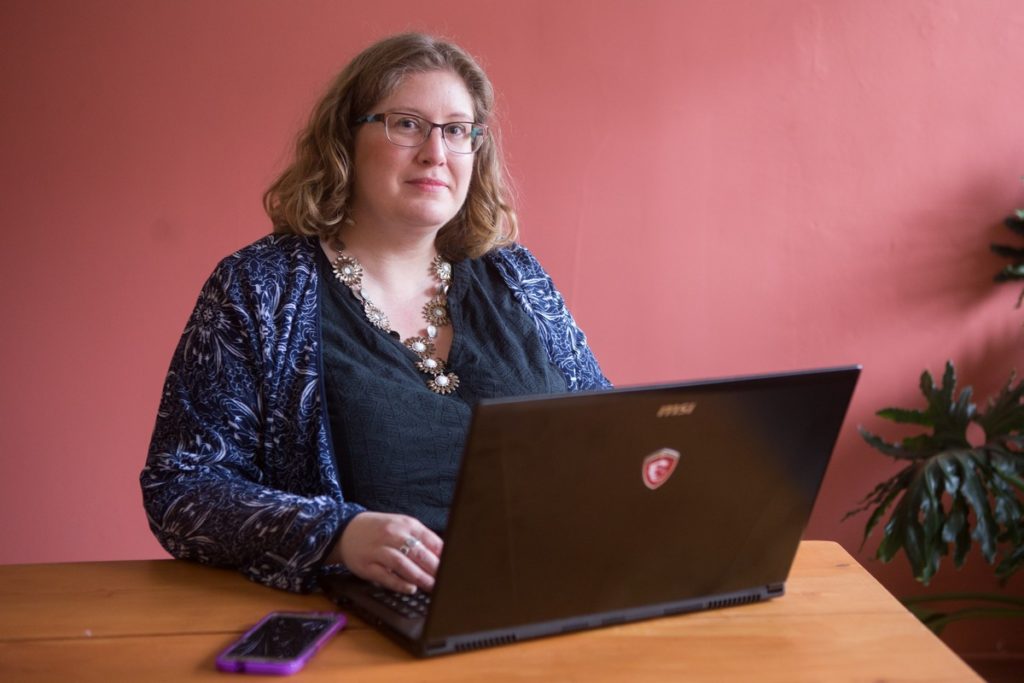
Let’s dig deep. Every Monday, I send out my Body Liberation Guide, a thoughtful email jam-packed with resources for changing the way you see your own body and the bodies you see around you. And it’s free. Let’s change the world together.
Hi there! I'm Lindley. I create artwork that celebrates the unique beauty of bodies that fall outside conventional "beauty" standards at Body Liberation Photography. I'm also the creator of Body Liberation Stock and the Body Love Shop, a curated central resource for body-friendly artwork and products. Find all my work here at bodyliberationphotos.com.

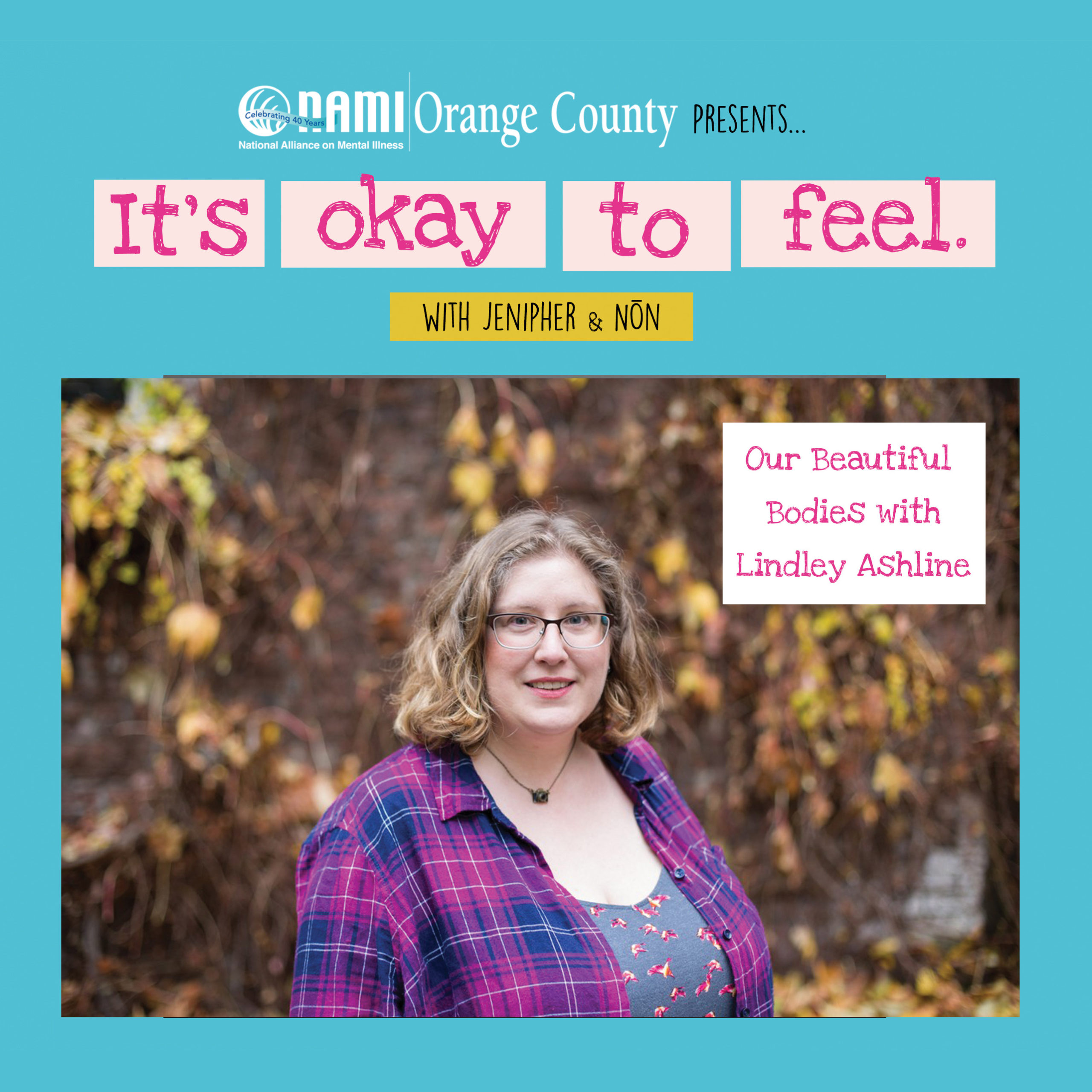
![Illustrated Art Stock: Plus Size Woman Covered with Flowers [Body Liberation Stock exclusive] - Body Liberation Photos & Stock](https://bodyliberationphotos.com/wp-content/uploads/2024/09/Illustrated-Art-Stock-Plus-Size-Woman-Covered-with-Flowers-Body-Liberation-Stock-exclusive-94337-600x600.jpg)
![Illustrated Art Stock: Plus Size Woman Twirls in a Skirt [Body Liberation Stock exclusive] - Body Liberation Photos & Stock](https://bodyliberationphotos.com/wp-content/uploads/2024/09/Illustrated-Art-Stock-Plus-Size-Woman-Twirls-in-a-Skirt-Body-Liberation-Stock-exclusive-94328-600x600.jpg)
![Illustrated Art Stock: Plus Size Woman Twirls in a Skirt [Body Liberation Stock exclusive] - Body Liberation Photos & Stock](https://bodyliberationphotos.com/wp-content/uploads/2024/09/Illustrated-Art-Stock-Plus-Size-Woman-Twirls-in-a-Skirt-Body-Liberation-Stock-exclusive-94323-600x600.jpg)
![Illustrated Art Stock: Plus Size Woman with Hands Over Breasts [Body Liberation Stock exclusive] - Body Liberation Photos & Stock](https://bodyliberationphotos.com/wp-content/uploads/2024/09/Illustrated-Art-Stock-Plus-Size-Woman-with-Hands-Over-Breasts-Body-Liberation-Stock-exclusive-94318-600x600.jpg)
![Illustrated Art Stock: Plus Size Woman with Hands Over Breasts [Body Liberation Stock exclusive] - Body Liberation Photos & Stock](https://bodyliberationphotos.com/wp-content/uploads/2024/09/Illustrated-Art-Stock-Plus-Size-Woman-with-Hands-Over-Breasts-Body-Liberation-Stock-exclusive-94313-600x600.jpg)
